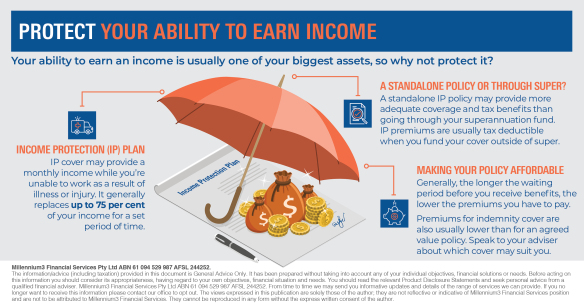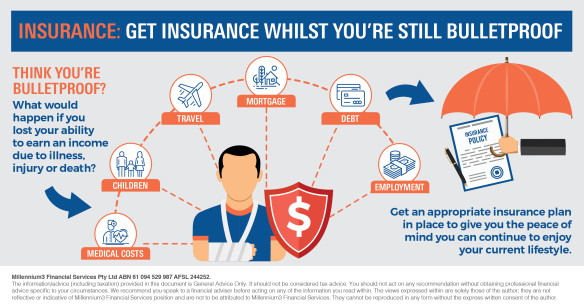Your ability to earn an income is usually one of your biggest assets, so why not protect it?

A sudden illness or injury can keep you from working and leave you in financial difficulty. You may get help from a worker’s compensation payout or personal savings, but are they enough to help you meet your expenses and financial obligations?
Taking out an income protection (IP) plan may help provide peace of mind that you’ll be able to meet your financial responsibilities and focus on recovering. IP cover may provide a monthly income while you’re unable to work as a result of illness or injury. It generally replaces up to 75 per cent of your income for a set period of time.
Standalone or through super?
Getting your IP cover through your superannuation fund may be a good idea if you want to avoid paying for your insurance out of pocket. But keep in mind that the policies offered through super may not cover all your financial obligations for an extended period of time.
A standalone IP policy may provide more adequate coverage. It may also offer you tax benefits – IP premiums are usually tax deductible when you fund your cover outside super.
Making your policy affordable
If cost is a concern in taking out a standalone plan, there are a few ways you may be able to make your premiums more affordable. One of them could be choosing a longer waiting period before you receive benefits after being unable to work due to illness or injury. Generally, the longer you wait, the lower the premiums you have to pay.
Opting for indemnity cover may also help you keep your insurance costs down. You’ll have to choose between indemnity and agreed-value cover for your IP plan. Under an indemnity policy, your insurer bases the monthly benefit you would be paid on your income at the time you make a claim. For an agreed-value policy, the benefit is based on your income when you apply for coverage. Premiums for indemnity cover are usually lower than for an agreed value policy.
But indemnity policies may vary among providers, so speak to your adviser about which cover may suit you. Your adviser may also help you tailor your plan to meet your income protection needs.
Get in touch with Dev Sarker today on 1300 71 71 36. We look forward to partnering with you to help protect what matters most in this incredible life, and help take the financial pressure off you and your loved ones.

